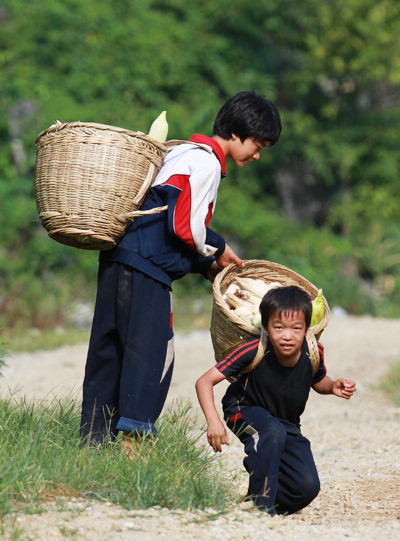|
 |
|
PRIMARY LABORER: Two boys in Linlan Village, Fengshan County in Guangxi Zhuang Autonomous Region, whose parents were working in cities, help each other to carry corn collected on August 1, 2011 (ZHOU ENGE) |
Li Tengfei is a primary school student in Qingshui Village, southwest China's Sichuan Province. Li's parents work in factories in Guangzhou, capital of Guangdong Province, which is more than 1,000 km away from his home. They only return home once a year around the Spring Festival, or the Chinese lunar New Year. Li spends the rest of the year with his grandfather in the village. The Li family is typical of the 40 households in Qingshui.
Li's grandpa cooks for Li every day, but he cannot help his grandson with his studies except for pushing him to finish his homework every day. Li receives phone calls from his parents once a week, but every week the conversation is more or less the same. "They ask whether grandpa is healthy and ask me to study hard," Li said.
Most local children's parents have left the village in order to earn money in cities.
Huang Qin, a 10-year-old girl who lives next door to Li, also has parents who work outside the village and she too only sees her parents once a year. "I really hope I can stay with them every day," Huang said. "I wish they were with me and would take me to parks often like parents living in cities."
In November 2011, The New York Times Book Review announced its list of the 10 best illustrated children's books of 2011. A New Year's Reunion, written by Chinese author Yu Liqiong, was included in the list. In the book, Yu describes a four-year-old girl named Maomao who is excited to meet her father during the Spring Festival.
At first, Maomao thinks her father is a stranger and even cries when her father tries to approach her. But gradually, she gets close to him and begins to follow her father everywhere. When the time comes for her father to leave, Maomao gives him a gift to remind him of the Spring Festival they spent together.
Yu, who was born in 1980, said the inspiration came from her own childhood memories. "My father is an engineer and had to leave home to go to many places across the country to work on different projects," Yu said. "I only saw him during the Spring Festival. Sometimes I couldn't even recognize him when he came back."
Yu said she was surprised that the story of Maomao received so much positive feedback. "Many people who read this book say it is a vivid description of the family conditions of migrant workers nowadays."
In Yu's childhood, there were only a few migrant workers. "I think it is a coincidence that Maomao's story happens to reflect the situation of migrant workers' families today," she said.
Family reunions are always important when family members don't live together. For migrant workers, the situation is even tougher.
However, family reunions are not always as warm and happy as the one depicted in Yu's book. Chen Zhengyi, a primary school student in Baihua Village, Sichuan, said that he felt indifferent toward his parents' return.
Chen's parents came back for the Spring Festival in 2011. But instead of bringing back new clothes and toys as presents, all Chen and his sister got was one chicken drumstick each, which they finished in five minutes.
"I don't even want them to come back, it's not fun at all," said Chen, who prefers to go to his neighbor's house as "they have color TVs and telephones and have more fun."
Chen has no telephone at home. Every time his parents call, his neighbors must ask Chen's grandmother to come to their house and answer the phone.
Chen's parents sometimes want to speak to him but usually they find that after two or three sentences they have nothing more to talk about.
"I even cannot remember what they look like," Chen said.
This year, his parents didn't return for the festival. "They work in Zhejiang Province, which is more than 2,000 km away, and to come back, they have to spend at least 3,000 yuan ($476) on transportation. They said it is more worthwhile to save the money for the children," Chen's grandma said.
But the children seem to need more than money. Chen has a very close friend who also comes from a very poor family but his friend's father lives in the village and spends time with his son every weekend. Chen often hears his friend say "my father says," and feels upset every time he hears the phrase.
| 